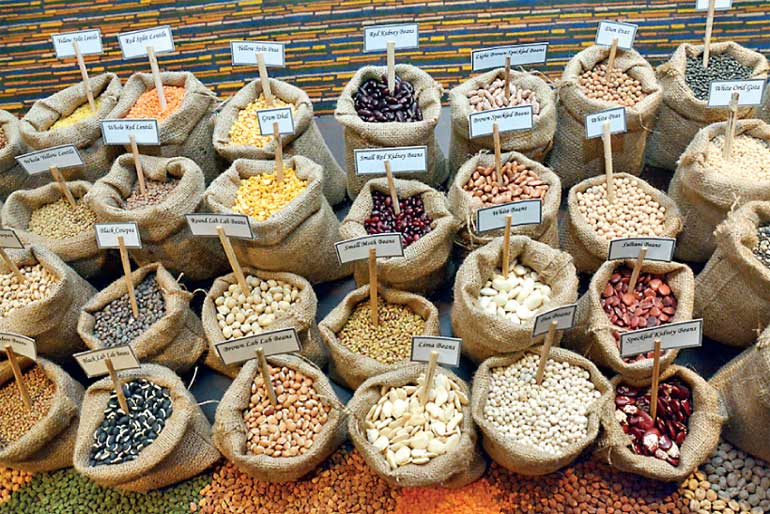Friday Feb 20, 2026
Friday Feb 20, 2026
Thursday, 25 February 2016 01:06 - - {{hitsCtrl.values.hits}}
By Charumini de Silva
In an effort to increase the consumption of beans and pulses in the country, Pulse Importers Association of Sri Lanka recently launched ‘Pulse Festival of Sri Lanka’ in Colombo.
This campaign was launched in line with 68th UN General Assembly declaring 2016 as the International Year of Pulses (IYP). The promotion aims to enhance public awareness of the benefits of pulses as part of sustainable food production and focuses on food security and nutrition.
Pulse Importers Association in affiliation with Essential Food Commodities Importers and Traders Association would conduct a series of events in collaboration with the Ministries of Health and Agriculture. They would also conduct educational promotions via schools and hotels on nutrition values of pulses.
 Pulses Splitting and Processing lndustry Managing Director Dr. A.C. Mahmud, Glolan International Managing Director Manjula Lanerolle, Hemitrade International Managing Director Hemaka Fernando and Omega Traders N. Selvaraj
Pulses Splitting and Processing lndustry Managing Director Dr. A.C. Mahmud, Glolan International Managing Director Manjula Lanerolle, Hemitrade International Managing Director Hemaka Fernando and Omega Traders N. Selvaraj
Pulse Importers Association Member Hemaka Fernando said with the planned programs lined up, they expect the pulse consumption in Sri Lanka to increase at least by 25% by the end of this year and for it to reach 100% by 2017.
During the past five years, nor has the demand or the consumption for pulses grown by 5% in Sri Lanka.
“We have the potential to grow the demand of pulses by 100% because Sri Lanka is not consuming even 25% of the adequate requirement of proteins. However, the price factor and the lack of interest in harvesting these crops has become a real challenge at present,” he pointed out.
He also said due to high content of protein, pulses are the best alternative of source of protein for vegetarians and for those animal protein sources are economically or physically not viable. Pulses are low in fat and reduce the cholesterol level and help combat obesity which is a common health and beauty challenge faced by many junk food eaters.

Thereby, the association urged the Government interference to take this message across the board as well as to facilitate certain foreign programs that is willing to support the cultivation of these crops in Sri Lanka.
“At the moment the Government of Canada and Australia are willing to provide seeds at subsidised rates, but then the officials of Government of Sri Lanka must lay the platform for the subsidised grains can come over here,” he noted.
On an average the Government spends over $ 650 million on importing key pulses such as chickpeas, green mung bean, red cowpea, white cowpea, black cowpea and kollu.
Further explaining on the challenges he said the farmers in Sri Lanka are not cultivating because they are not getting a proper price owing that there is no market for his produce.
One other factor he pointed was the increased the import duty of some of the commodities, which the Association suggested the Government to keep it at a more balance rate thereby to encourage consumption.
“We as traders are willing to purchase the locally produced harvest. Some pulses can be cultivated in not so fertile and semi-arid lands where other crops have little chance of growing. If the farmers are aware that pulses have a great demand and a price for their production it will encourage them to cultivate as well,” he stressed.
Highlighting the importance of food security through the cultivation of pulses he said either depletion of nutritional value or rotting does not occur in the action of storing these dry seeds. Thus, pulses can be stored for an elongated period. This increases food availability between harvests and assures food security. (CDS)
Pix by Upul Abayasekara